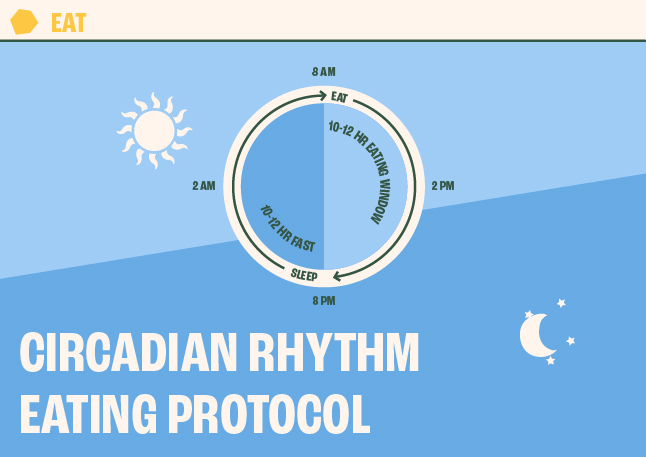If you have read my book The Proof is in the Plants, you will be well aware that when it comes to feeling better for longer, it’s not just what we eat that matters but also when we eat. Over the past 10 years an emerging area of science, called chrononutrition, has begun to unearth valuable information about how the timing of our meals affect can affect our health.
In short, circadian rhythms are what control metabolic processes such as digestion, body temperature, blood glucose control, the rise and fall of hormones and neurotransmitters, and our ability to utilise nutrients and energy in our food. These rhythms are nature’s way of priming our physiology for what we are about to do – so we can function more productively over the course of a 24 hours period. So, when we are waking up our physiology changes in a way that helps us become more alert and better able to utilise nutrients in our food. And the opposite for when we are nodding off to sleep, physiological changes that favourite relaxation and recovery.
So why is this important? Well, just like erratic light exposure, erratic eating patterns can throw these natural rhythms out of whack – known as circadian disruption. You may have experienced jet lag before – brain fog, fatigue, head ache, difficulty sleeping etc. This is an example of acute circadian disruption. On the other hand, eating erratically on the daily has the capacity to provoke chronic circadian disruption or chronic ‘jet-lag’ which is associated with weight gain, poor sleep, increased risk of developing chronic disease and a shorter life.
The good news is by establishing a regular eating pattern, informed by the latest chrononutrition science, we can nurture our circadian rhythms and at the same time experience benefits ranging from weight loss, better sleep, improved blood pressure, improved blood glucose control to a higher quality of life. Interestingly, these metabolic benefits, seem to be independent of weight loss as discussed here and here. That is, even without weight loss, we can tap into these other benefits. So what does an ideal circadian rhythm protocol look like based on today’s evidence?
The Protocol
1 – Try to eat within a window of less than 10 hours (e.g 9am-7pm)
2 – Try to allow a few hours after waking before eating and eat your last food 2-3 hours before going to sleep.
3 – Try to eat more of your food towards the earlier part of the day, when you’re more active, and then have a lighter dinner.
Additional context:
As with most things in nutrition science context is key. Is the timing of our meals as important as the quality of our diet? No, not likely. Is the timing of our meals more important than the total calories we eat? No, I don’t think so. There is clear benefit in not consuming excessive calories beyond your bodies physiological requirement and there is growing evidence to suggest that in certain contexts eating over a shorter eating window with more calories earlier in the day is also beneficial. I would like you to see this protocol as a tool not a panacea or silver bullet.
I hope you find this information useful. If you put this science-based protocol into practice I would love to hear from you on Instagram and/or Twitter.
For more information checkout my podcast episode with Chrononutrition experts Emily Manoogian, PhD, and Courtney Peterson, PhD.
P.S I am often asked what supplements I take. So I finally got around and created an in depth Supplement Guide, totally free, that you can download, along with a bunch of other free guides. Inside this guide is information about daily supplements for everyday wellness along with performance supplements. The daily supplement I personally take is a multi-nutrient called Essential 8 by Eimele. This is a product I formulated for Eimele, alongside their team, that specifically contains the 8 key nutrients that plant-based eaters often fall a little short in – Omega 3’s from algae, B12, Vitamin D3 from mushroom, iodine from seaweed, calcium, zinc, selenium and iron. The right forms, in the right doses to compliment your plant-rich diet. To find out more, or subscribe to a monthly delivery, head to eimele.com and use the code SIMON for 10% off your purchase.







